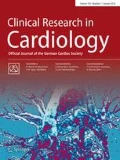Zusammenfassung
Nach den Ergebnissen zahlreicher Studien werden Patienten nach einer koronaren Katheterintervention in der Regel mehrere Tage bis Wochen krankgeschrieben und damit dem Arbeitsprozess länger als medizinisch notwendig entzogen. Hierdurch entstehen bedeutende indirekte Kosten, die den prinzipiellen finanziellen Vorteil dieser Methode schmälern. Die prospektive, randomisierte Interventionsstudie geht der Frage nach, ob sich durch eine gezielte Aufklärung des Patienten und des Hausarztes eine schnellere Rückkehr ins Berufsleben erzielen lässt. 104 berufstätige Patienten (mittleres Alter 52,4 Jahre) nach erfolgreicher Katheterintervention wurden randomisiert der Interventionsgruppe (konkrete Information von Patient und Hausarzt) oder der Kontrollgruppe (keine gezielte Aufklärung) zugeteilt, 100 konnten über 4 Monate nachverfolgt werden. In diesem Zeitraum waren 81 der Patienten wieder ins Berufsleben zurückgekehrt (mittlere Dauer 18,9±24,8 Tage, Median: 8 Tage) und 19 weiter krankgeschrieben. In der Kontrollgruppe lag die Rate an Berufsrückkehrern bei 79%, die mittlere Krankschreibungsdauer betrug 16,4±22,0 Tage (Median 7). In der Interventionsgruppe kehrten 83% in das Berufleben zurück, im Durchschnitt nach 21,5±27,4 Tagen (Median 10). Statistisch fand sich zwischen den Randomgruppen kein signifikanter Unterschied bzgl. Rückkehrrate und Dauer der Krankschreibung. Von den Privatpatienten des Gesamtkollektivs (23%) nahmen jedoch 96% ihre Arbeit wieder auf (5,7±5,1 Tage, Median 3,5), bei den Kassenpatienten (77%) betrug diese Rate lediglich 77% (23,7±27,4 Tage, Median 11). In Abhängigkeit vom Versicherungsstatus erwies sich auch der Unterschied in der Krankschreibungsdauer als hochsignifikant (p=0,0003). Demzufolge lässt sich die postinterventionelle Krankschreibungsdauer auch durch eine gezielte Aufklärung von Patient und Hausarzt nicht verkürzen, vielmehr scheinen für die Rückkehr ins Berufsleben von medizinischer Seite nicht unmittelbar beeinflussbare, soziale und psychologische Faktoren ursächlich.
Summary
Coronary catheter revascularisation is less costly than bypass surgery due to lower direct (medical) and indirect costs (loss of work). Many studies show that the time patients stay out of work following coronary intervention is much longer than necessary. This leads to a considerable increase of indirect costs, which can far exceed the medical costs of the treatment. This prospective randomised study was done to determine whether specific information to patient and family doctor results in an earlier return to work. After catheter revascularisation 100 working patients (mean age 52.4 years) were randomised either to the intervention group (information to patient and family doctor) or to the control group (no specific information about return to work). Four months later 81 patients had returned to their previous jobs (mean sick leave 18.9±24.8 days) while 19 were still out of work. In the control group, the rate was 79% and the mean sick leave was 16.4±22.0 days (median 7); in the intervention group 83% had returned to work after a mean of 21.5±27.4 days (median 10). There was no significant difference between the two groups, neither according to the rate of returned workers nor to the duration of sick leave. In the subgroup of patients with a private insurance (23% of all) 96% started to work again (mean sick leave 5.7±5.1 days median 3.5), while the rate was 77% in the group of panel patients (mean sick leave 23.7±27.4 days, median 11). The difference in sick leave between these two groups was highly significant (p=0.0003). Specific information to the patient and family doctor has no effect on the time patients stay out of work following catheter revascularisation. It seems that the observed delay depends on social and psychological factors that cannot be influenced directly.
Author information
Authors and Affiliations
Additional information
Eingegangen: 8. Januar 2001 Akzeptiert: 23. März 2001
Rights and permissions
About this article
Cite this article
Pfund, A., Pütz, J., Wendland, G. et al. Koronarintervention und berufliche Reintegration – Eine prospektive, randomisierte Interventionsstudie (KIRL). Z Kardiol 90, 655–660 (2001). https://doi.org/10.1007/s003920170113
Issue Date:
DOI: https://doi.org/10.1007/s003920170113

